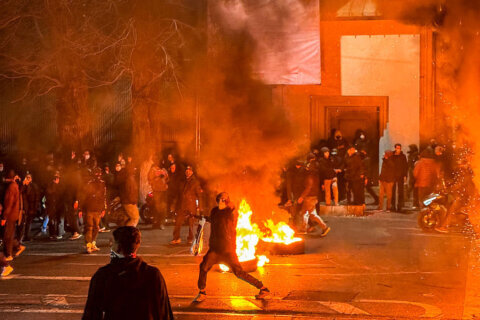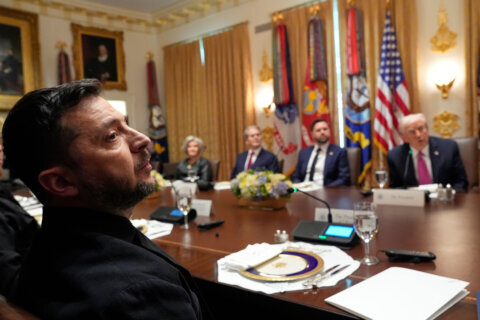WASHINGTON — Tuesday marks the third anniversary of the initiation of the Combined Joint Task Force Operation Inherent Resolve (CJTF-OIR), the U.S.-led coalition to destroy the Islamic State of Iraq and the Levant (ISIS).
Ironically, the operation has suffered a setback — not from ISIS, but because of infighting between the Iraqi military and Kurdish forces.
In the predawn hours of Monday, U.S. military forces near Kirkuk became aware of what they called “a limited exchange of fire,” between Iraqi and Kurdish forces.
The Coalition released a statement about the early-morning activity, saying, “We believe the engagement this morning was a misunderstanding and not deliberate as two elements attempted to link up under limited visibility conditions.”
The Coalition also said it is “monitoring movements of military vehicles and personnel in the vicinity of Kirkuk, and the movements of military vehicles, so far, have been coordinated movements, not attacks.”
Peshmerga forces in the region tell WTOP a more intense story.
Bayan Sami Abdul Rahman, Representative of the Kurdistan Regional Government to the U.S., told WTOP, “Frankly I’m puzzled by the statement that there was some kind of misunderstanding. There was no misunderstanding.”
“These forces, including Iranian militia, have continued to advance toward Kirkuk and came in contact with the Peshmerga Security Forces. There are casualties on both sides,” said a source directly connected to the Peshmerga.
The Ministry of the Peshmerga said as of noon Monday local time, the Iraqi led forces had taken over the Governor’s office “and forced Dr. Najmaldin Karim to flee to safety in Erbil.”
“Kirkuk and Tuz Khurmatu have completely fallen to Iranian militia and hundreds have been killed, including tens of volunteers and civilians who have been tortured on the streets by the Shia militias,” said the source.
There are other reports that homes belonging to Kurds have been destroyed in Kirkuk and Tuz Khurmato and oil fields have been seized by Shia militias.
Abdul Rahman, pleading for U.S. leadership to stop the activity, said the militias “are heavily armed, some of them using American weapons such as Abrams tanks and heavy artillery against the Peshmerga.”
And she warned the U.S. that “attempts to downplay what’s happening in Kirkuk are misguided. This is a disaster.”
U.S. military officials caution that some of the information coming from the region may be exaggerated. But in Washington, the concern is profound.
President Donald Trump told reporters, “We don’t like the fact that they’re clashing. We’re not taking sides. We’ve had for many years a very good relationship with the Kurds as you know and we’ve also been on the side of Iraq, even though we should have never been there in the first place. We should never have been there. But we’re not taking sides in that battle.”
U.S. Rep. Adam Schiff, D-California, said in a tweet, “Concerned by tension between Iraqi army and Kurdish Peshmerga over independence referendum. US must mediate — Could undermine war on ISIS.”
Colonel Ryan Dillon, spokesman for CJTF-OIR, based in Baghdad, told WTOP, “it’s concerning to us that the attention has clearly turned toward Kirkuk and is impacting the fight against ISIS, which we still see as the largest threat to the area to Iraqis, both to Kurds and Arabs alike.”
Dillon said the Kirkuk situation has distracted military Iraqi and Kurdish military planners at a crucial time, because the war against ISIS is in its final stages.
The unease is rooted in the possibility that ISIS could morph from the army that it was into an insurgency if not completely defeated and rooted out of the region.
The Coalition statement also says “forces and advisers are not supporting Government of Iraq or Kurdistan Regional Government activities near Kirkuk,” and “strongly urges all sides to avoid escalatory actions.”
“We continue to advocate dialogue between Iraqi and Kurdish authorities. All parties must remain focused on the defeat of our common enemy, ISIS, in Iraq,” said Maj. Gen. Robert White, commanding general of the Combined Joint Forces Land Component Command — Operation Inherent Resolve.








